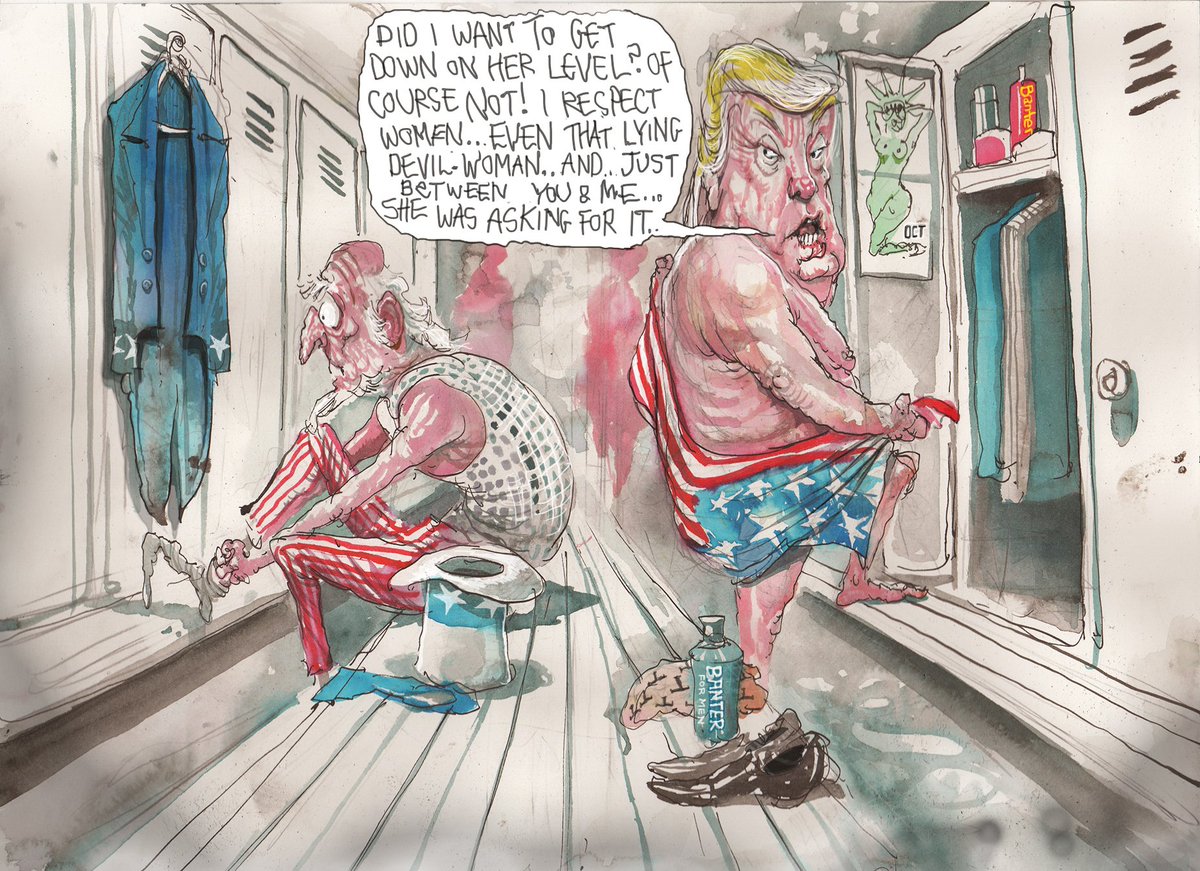
During an extended monologue on her TBS show Full Frontal on Monday evening, Samantha Bee described Donald Trump and Billy Bush as “two drooling hyenas” and “two leering dildos.” She referred to the vehicle that carried the pair, in that now iconically infamous Access Hollywood video, as “the adolescent boner bus” and, later, “Donny and Billy’s fun-time pussy wagon.” She compared Bush’s deference to Trump to George W. Bush’s deference to Dick Cheney, and then referred to both of the latter as “a bullying, cold-hearted alpha male who was completely in charge.”
Later, in response to the non-apology apology that Trump read dutifully off of a Teleprompter, Bee said, “I’m sorry, you were handing out words like a first-grader with a head injury.”
This … was funny! It was, many of Bee’s viewers would likely agree, correct! But it was also a lot of empty vitriol, even for a comedian who’s known for channeling rage into lols. With her “leering dildo” burns, the host was effectively summoning the disgust that many women—indeed, many sentient humans—felt upon hearing the Republican presidential candidate casually brag about his sexual predations to a guy who verbally high-fived him in response. But she was also compounding the frustration as much as offering catharsis from it. Bee, in dismissing Trump and Bush as “drooling hyenas,” was living in the tenor of this anger-reveling election, meeting the Trump revelations not with the Democrats’ borrowed motto—“when they go low, we go high”—but rather with the opposite logic: “When they go low, we limbo right along with them.”Bee met “when they go low, we go high” with the opposite logic: “When they go low, we limbo right along.”
Bee’s job, certainly, is not to reflect campaign-driven talking points. Nor is it to model civility. Nor is it, officially, to do anything beyond making viewers love her or hate her and thereby watch her, week after week. Full Frontal, though, is one of the many current late-night shows—hybrids of comedy and commentary—that strive to live in the legacy of the Jon Stewart-helmed Daily Show: to use humor, asThe Wrap put it, to “become part of the cultural conversation.” Full Frontal set as its challenge from the outset, Rebecca Traister reported, to parse the delicate lines “between horror and humor, between outrage and hilarity,” provoking not just laughter, but action and impact. And Full Frontal has been for the most part extremely effective at striking that balance, via segments that marry the best ofinvestigative journalism with the worst of cathartic indignation.
RELATED STORY

Samantha Bee: The Natural Heir to Jon Stewart
Monday’s show, though, featured very little of either. It offered, for the most part, a string of invective that simply reiterated what anyone who had paid attention as “Pussyghazi” played out over the weekend was already well aware of: that “pussy,” the word, was not the problem; that bragging about sexual predation was; that it’s extremely hypocritical for GOP lawmakers who endorsed a known racist/misogynist/demagogue to decide that the Access Hollywood revelations represented the thing that, in the end, would make the candidate unworthy of the presidency. Mostly, though, the episode offered anger—anger that didn’t attempt to temper itself under the guise of “satire.” Anger that seethed. Anger that directed itself at the “leering dildos” who presented themselves on the tapes. Anger that trusted in itself as its own end.
It had reason to do that trusting. “Samantha Bee Takes Down ‘Leering Dildo’ Donald Trump ‘Like a Bitch,’” The Daily Beast summed it up, appreciatively. “Samantha Bee pulled no punches,” the Huffington Post countered. It’s worth wondering, though, what else is accomplished when even comedy—even the thing meant to give us a little levity among all the ugliness—gets angry. The cliche about Trump is that he’s extremely hard to parody precisely because he so neatly parodies himself. There’s no work the comedian can add to make him funnier, no insight that can be added to make him more cartoonish or outlandish than he already is. But the corollary to all that might be that Trump also makes comedy hard precisely because comedy demands a certain emotional detachment on the part of both the comedian and the audience. You have to distance yourself from something to be able to laugh at it; and Trump, at this point, is very, very hard to laugh at.
It’s sometimes said about Trevor Noah, by way of explaining why he doesn’t enjoy the same rabid enthusiasm that his predecessor did, that he’s a little too cold, a little too detached, a little too balanced to endear himself fully to partisan viewers. Noah, the South African, sees American politics with a global perspective, but doesn’t grok the outrage—and often, with the rise of Trump, the full-on rage—that so many people on the left feel about the current state of the world. You could think of Noah, Slate’s Willa Paskin argued, as “a Potemkin Jon Stewart, someone smooth and ingratiating who is reaching for unconverted viewers, instead of an inveterate political satirist preaching to the deeply informed.”
Bee may have just illustrated the opposite problem: Heat can be just as challenging as coolness. It is very, very hard to do satire when you are angry. It’s very hard to do, actually, much of anything when you’re angry. Bee has acknowledged that perfectly in previous episodes of Full Frontal (“Is it okay if, instead of making jokes, I just scream for seven minutes until we cut to commercial?” she asked after the Orlando shootings). But while her anger about Trump may be similarly righteous, it’s an open question how productive it is. In a previous episode, she referred to Trump as “a tangerine-tinted trash can fire,” which is funny but not much more than that. Audiences may look for catharsis in their comedy, but they also look for sense-making—for jokes that don’t simply mock the world, but help to explain it. Anger is one way of making sense of things. Very rarely, however, is it a terribly good one.
No comments:
Post a Comment